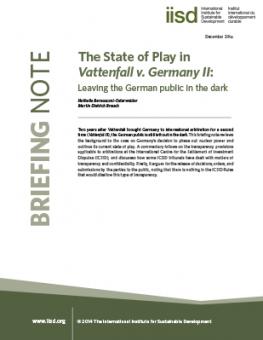
The State of Play in Vattenfall v. Germany II: Leaving the German public in the dark
Two years after Vattenfall brought Germany to international arbitration for a second time (Vattenfall II), the German public is still left out in the dark. This briefing note reviews the background to the case on Germany’s decision to phase out nuclear power and outlines its current state of play.
Two years after Vattenfall brought Germany to international arbitration for a second time (Vattenfall II), the German public is still left out in the dark.
This briefing note reviews the background to the case on Germany’s decision to phase out nuclear power and outlines its current state of play. A commentary follows on the transparency provisions applicable to arbitrations at the International Centre for the Settlement of Investment Disputes (ICSID), and discusses how some ICSID tribunals have dealt with matters of transparency and confidentiality. Finally, it argues for the release of decisions, orders, and submissions by the parties to the public, noting that there is nothing in the ICSID Rules that would disallow this type of transparency.
You might also be interested in
The German Nuclear Phase-Out Put to the Test in International Investment Arbitration? Background to the new dispute Vattenfall v. Germany (II)
The Swedish energy company Vattenfall has now followed through on its threat to bring an international arbitration claim against Germany in relation to that country's recent decision to phase out nuclear power. Damages claimed by Vattenfall could exceed €700 million.
Background paper on Vattenfall v. Germany arbitration
This paper provides background on an investment dispute between the Swedish energy utility Vattenfall and the Government of Germany pursuant to the Energy Charter Treaty.
Agreement on Climate Change, Trade and Sustainability: A landmark pact for trade and sustainability
The ACCTS pact, signed by Costa Rica, Iceland, New Zealand, and Switzerland, aligns trade and environmental policies, tackling fossil fuel subsidies, eco-labels, and green trade.
Why the Energy Charter Treaty Modernization Doesn't Deliver for Climate
The Energy Charter Conference adopted the "modernized" Energy Charter Treaty (ECT) on December 3, 2024. IISD's Lukas Schaugg explains what the modernization does, when it will enter into force, its tension with EU law, and why the reformed ECT can still hinder climate policies.